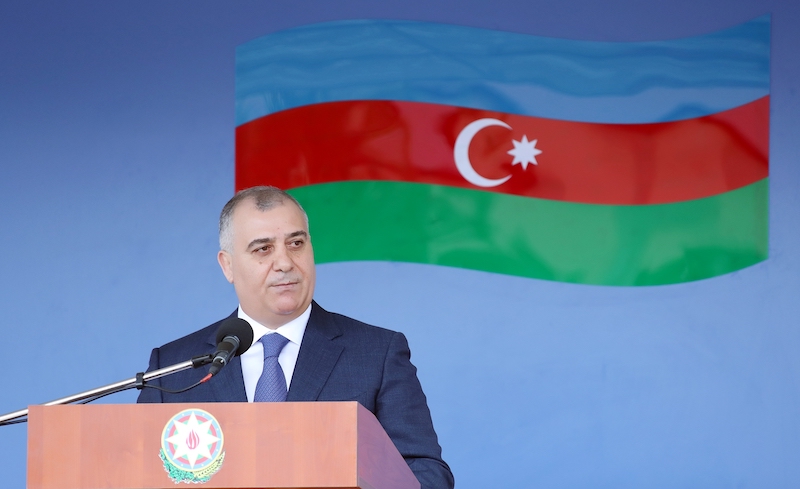The all-male group in charge of the climate summit organisation includes oil and gas executives and controversial government officials
Azerbaijan has appointed fossil fuel executives and controversial government officials to the committee tasked with organizing the Cop29 climate summit.
The 28 members of the all-male group include senior executives from state-owned oil and gas giant Socar and electricity producer Azerenerji, the president of Azerbaijan, Ilham Aliyev has announced.
The government had earlier selected its environmental minister Mukhtar Babayev as the Cop29 president. Babayev spent 26 years at Socar before joining the government.
Collin Rees, a campaign manager at Oil Change International, said Azerbaijan’s personnel decisions are “pushing us closer to the abyss”.
“The climate movement demands a process free of fossil influence, including real conflict of interest policies to keep fossil interests from co-opting the talks”, he added.
The oil and gas executives will sit on the committee alongside government ministers and officials whose families have been accused of participating in controversial offshore financial schemes.
Women absent
Azerbaijan gets roughly two-thirds of its income from oil and gas. European states are its biggest customers. It is one of the countries most economically reliant on fossil fuels in the world and has plans to increase its fossil fuel production by a third over the next decade, according to Rystad data.
Veteran US and Chinese climate envoys step down
As the country gears up to host Cop29 in November, Aliyev has put the organising committee in charge of drafting an “action plan” for the summit. The group will also be tasked with setting up an operational company responsible for the logistics of the event.
The committee comprises 28 men and no women in a move slammed as “regressive” by the She Changes Climate campaign group. Men dominate Azerbaijan’s government and state-owned enterprises.
Oil and gas represented
Balababa Rzayev is the head of Azerenergy, the country’s biggest utility company, which produces the vast majority of its electricity in oil and gas power plants, alongside some hydropower stations.
AzerEnergy is building over a dozen power stations in the southwestern Karabakh region, which Azerbaijan regained control of last year following a deadly conflict with neighboring Armenia.
The company has allegedly handed out contracts for the construction of the energy facilities to firms linked to members of Rzayev’s family, according to a report by the Azeri think-tank Economic Research Center.
The other fossil fuel executive around the organising committee table will be Ruslan Aliyev, general director of Azerigas. This is the gas distribution division of oil and gas giant Socar, the company where Cop29 president Babayev spent 26 years.
High stakes for climate finance in 2024
Socar ranked 91st out of 99 companies recently profiled by the Oil and Gas Benchmark, which assessed companies on their alignment to a low-carbon world. “Socar has no evidence of supporting a just transition”, the report said.
“The company’s strategy includes limited measures to reduce emissions such as increased energy efficiency, addressing methane leaks and reducing flaring.” Socar has recently announced the creation of a renewable energy division.
Secretive payments
Members of the Azerbaijan Cabinet make up nearly half of the Cop29 organising committee.
Among them is Ali Naghiyev, the head of the state security service, the main domestic intelligence agency. Azerbaijan has been repeatedly been accused of using controversial spyware to target opposition leaders, journalists and civil society both at home and in neighboring Armenia.
Naghiyev’s family were also embroiled in the Azerbaijani Laundromat scandal, a complex money laundering scheme and slush fund that siphoned billions out of the country.
The Organized Crime and Corruption Reporting Project (OCCRP) alleged that a Czech real estate company controlled by Naghiyev’s sons received over a suspected $1.25 million payment from a firm at the center of the scheme. He declined to comment for that article.

Ali Naghiyev has been serving as Azerbaijan’s security chief since 2019. Photo: Interfase
At the time Naghiyev was the deputy chief of the country’s anti-corruption office tasked with investigating state officials for conflicts of interest, nepotism, and other abuses.
Kamaladdin Heydarov, the minister of emergency situations, will also be sitting on the committee.
Regarded as one of the richest and most powerful figures of the governing elite, Heydarov acquired “massive wealth” during his tenure as chairman of the state customs agency — “an agency that is notoriously corrupt, even by Azerbaijani standards”, US diplomat Donald Lu said in 2010.
His children were implicated in a scheme using offshore companies as cover for investments in luxury properties, businesses, and high-end hotels across Europe and the Middle East, according to OCCRP. A lawyer for the family said at the time that it was an “entirely legitimate and lawful business” and denied Lu’s characterization of the family, calling him “not a reliable source.”
A spokesperson for the government of Azerbaijan did not immediately respond to a request for comment.

